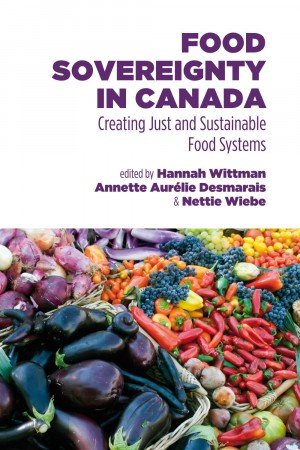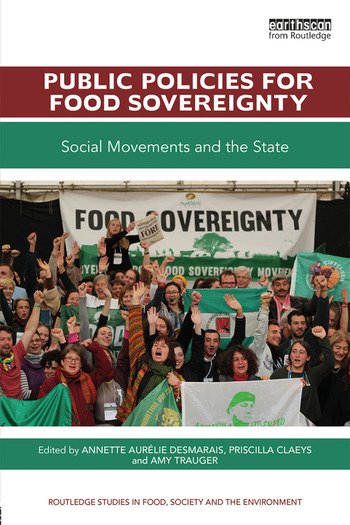
Books
Photo credit: Katherine Aske
Learn more about food sovereignty.
-

Frontline Farmers: How the National Farmers Union Resists Agribusiness and Creates Our New Food Future
Edited by Annette Aurélie Desmarais, 2019, Fernwood Publishing
Who grows the food we eat? How important is it that family farms are viable in Canada today and in the future? How do viable family farms help determine the safety, diversity and sustainability of Canada’s food systems? Why is this important to those of us who do not farm?
Frontline Farmers introduces readers to the National Farmers Union (NFU). For over fifty years, the NFU has been on the frontlines of our food system. From fighting against transnational corporations that seek to control our food system by imposing genetically modified organisms into our food, to protecting seeds, maintaining orderly marketing, saving the prison farms, keeping the land in the hands of family farmers, farming ecologically and building food sovereignty, the NFU has been front and centre of farm and food activism.
This book collects the voices of NFU members who tell the stories of the key struggles of the progressive farm movement in Canada: fighting to build viable rural communities, protecting the family farm and creating socially just and ecologically sustainable food systems. Frontline Farmers reveals that the stakes for controlling our food in Canada have never been higher.
-

Food Sovereignty in Canada: Creating Just and Sustainable Food Systems
Edited by Hannah Wittman, Annette Aurélie Desmarais, and Nettie Wiebe, 2011, Fernwood Publishing
Contemporary Canadian agricultural and food policies are contributing to the current global food crisis: the industrialized, high-input, export-driven agricultural production sector, coupled with concentrated corporate processing and retailing, are ecologically unsustainable, increasingly unaffordable, unhealthy and socially unjust. Employing an interdisciplinary and multi-sectoral approach, Food Sovereignty in Canada explores how communities all over the country are actively engaged in implementing alternative agricultural and food models within the framework of food sovereignty – taking control over food-producing resources, markets and agricultural policy. This framework offers Canadian citizens, researchers and policymakers the opportunity to build alternative agricultural and food models that are less environmentally damaging and that keep farmers on the land while ensuring that those living in cities have access to healthy and safe food. Achieving food sovereignty requires conceptual and practical changes, reshaping menus, farming, communities, relationships, values and policy, but, as the authors clearly demonstrate, the urgent work of building food sovereignty in Canada is well under way.
In case studies of practical action, Food Sovereignty in Canada provides an analysis of indigenous food sovereignty, orderly marketing, community gardens, the political engagement of nutritionists, experiences with urban agriculture and the strengthening of links between rural and urban communities. It also highlights policy-related challenges to building community-based agriculture and food systems that are ecologically sustainable and socially just. This book is essential reading for anyone interested in holistic, healthy and sustainable food production and consumption.
-

Food Sovereignty: Reconnecting Food, Nature and Community
Edited by Annette Aurélie Desmarais, Nettie Wiebe, and Hannah Wittman, 2010, Fernwood Publishing
Advocating a practical, radical change to the way much of our food system currently operates, this book argues that food sovereignty is the means to achieving a system that will provide for the food needs of all people while respecting the principles of environmental sustainability, local empowerment and agrarian citizenship. The current high input, industrialized, market-driven food system fails on all these counts. The UN-endorsed goal of food security is becoming increasingly distant as indicated by the growing levels of hunger in the world, especially among marginalized populations in both the North and South. The authors of this book describe the recent emergence and the parameters of an alternative system, food sovereignty, that puts the levers of food control in the hands of those who are both hungry and produce the world’s food - peasants and family farmers, not corporate executives. As the authors show in both conceptual and case study terms, food sovereignty promises not only increased production of food, but also food that is safe, food that reaches those who are in the most need, and agricultural practises that respect the earth.
-

La Via Campesina: Globalization and the Power of Peasants
Annette Aurélie Desmarais, 2006, Fernwood Publishing
In 1993, 46 farm leaders from various countries met in Mons, Belgium, determined to develop a strategy to challenge the devastation caused to their communities by a neoliberal international economic agenda. Over the next decade they and millions of peasants and small-scale farmers around the world used La Vía Campesina to forge a powerful and radical force of opposition. Where did they find the capacity and strength to challenge multinational agribusiness corporations and international institutions whose power and influence increasingly dictate national government policy? This book accompanies La Vía Campesina in a struggle to keep people on the land, producing food and culture, and building viable communities.
-

Public Policies for Food Sovereignty: Social Movements and the State
Edited by Annette Aurélie Desmarais, Priscilla Claeys, and Amy Trauger, 2017, Routledge
An increasing number of rural and urban-based movements are realizing some political traction in their demands for democratization of food systems through food sovereignty. Some are pressuring to institutionalize food sovereignty principles and practices through laws, policies, and programs. While the literature on food sovereignty continues to grow in volume and complexity, there are a number of key questions that need to be examined more deeply. These relate specifically to the processes and consequences of seeking to institutionalize food sovereignty: What dimensions of food sovereignty are addressed in public policies and which are left out? What are the tensions, losses and gains for social movements engaging with sub-national and national governments? How can local governments be leveraged to build autonomous spaces against state and corporate power?
The contributors to this book analyze diverse institutional processes related to food sovereignty, ranging from community-supported agriculture to food policy councils, direct democracy initiatives to constitutional amendments, the drafting of new food sovereignty laws to public procurement programmes, as well as Indigenous and youth perspectives, in a variety of contexts including Brazil, Ecuador, Spain, Switzerland, UK, Canada, USA, and Africa. Together, the contributors to this book discuss the political implications of integrating food sovereignty into existing liberal political structures, and analyze the emergence of new political spaces and dynamics in response to interactions between state governance systems and social movements voicing the radical demands of food sovereignty.